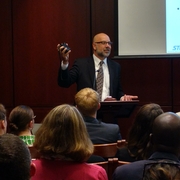Capitol Hill Briefing
June 22nd, 2016
4:00pm - 5:30pm
Capitol Visitor Center, Room SVC-209
Please RSVP to Elizabeth Goldbaum ([email protected])
Light refreshments will be provided.
Topic:
Robust data collections are vital for understanding and managing Earth's natural resources and hazards:
- Earthquake data can help identify quake-prone areas and inform earthquake preparedness.
- Air quality data can reveal potential health risks and hazards from air pollution.
- Water quality data can capture noteworthy trends and changes in safety and accessibility.
Ongoing efforts to build comprehensive and reliable data sets from various sectors of Earth Science help experts make informed decisions that keep communities safe.
This briefing features experts from industry, academia, and state and federal government agencies to discuss how Earth Science data is collected, used, and disseminated. Speakers will address current protocols and future endeavors in data collection.
- The Global Seismic Network includes over 150 stations installed all over the world that record and collect ground motion data caused by earthquakes.
- Sonoma Technology, Inc. uses data to provide innovative, science- and technology-based solutions for environmental challenges occurring around the globe.
- The USGS Virginia and West Virginia Science Center's data collection and research helps inform and promote safe and effective water resource management practices.
Speakers:
- Katrin Hafner
Global Seismic Network Program Manager
Incorporated Research Institutions for Seismology - Tim Dye
Senior Vice President and Chief Business Development Officer
Sonoma Technology, Inc. - Mark Bennet
Director
USGS Virginia and West Virginia Water Science Center - Virginia Burkett
Associate Director for Climate and Land Use Change
U.S. Geological Survey
Moderator
Part of the Advances in Earth Science Briefing Series
Presented by:
- American Association for the Advancement of Science
- American Association of Petroleum Geologists
- American Geophysical Union
- American Geosciences Institute
- American Meteorological Society
- Association of American State Geologists
- Bureau of Safety and Environmental Enforcement
- Geological Society of America
- National Ground Water Association
- National Science Foundation - Directorate for Geosciences
- Consortium for Ocean Leadership
- Soil Science Society of America
- U.S. Geological Survey
